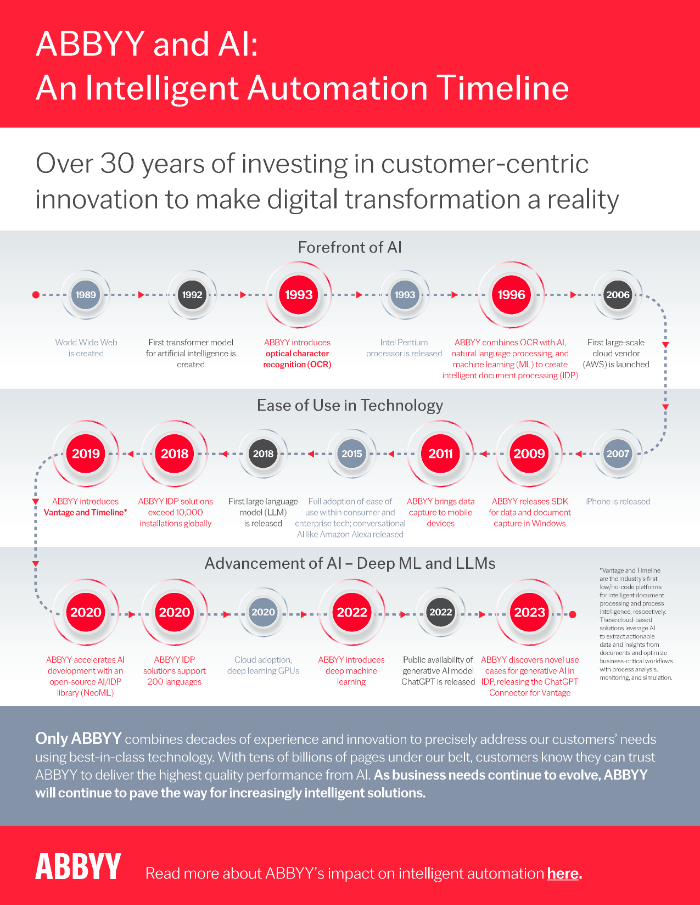
Shaping Tomorrow's Businesses with Advanced Large Language Models

Shaping Tomorrow’s Businesses with Advanced Large Language Models
Back to The Intelligent Enterprise
Are Large Language Models (LLMs) the Future?
by Maxime Vermeir, Senior Director, AI Strategy
When we talk about the rapid advancements in AI and ML, it’s worth noting that these technologies are older than commonly believed. For instance, the first recurring neural network was published in 1925, and computer vision was invented in 1974, predating the worldwide web. The first transformer, which forms the basis for LLMs, was created in 1992, even before the release of the Intel Pentium processor.
Share
Data is all around us, and we have a lot more of it than most realize…about 64 zettabytes of data.
To put that in context: If one terabyte were equivalent to one kilometer, a single zettabyte would be like embarking on 1,300 round trips to the moon and back.
And let’s not forget, we’re talking about 64 zettabytes, not just one. That’s an enormous amount of data. However, a significant portion of this data is not easily accessible and remains unstructured. When we consider the pace at which technology has evolved, it’s not surprising.

If we take a walk through Tech History Lane, it’s fascinating to see how far we’ve come. We started with the invention of the first electric battery in the 1800s, and it took another century for commercial lighting systems to become widespread.
Bringing value to people is at the cornerstone of everything we do at ABBYY. Decades ago in 1993, we introduced our first innovative evolution of technology, optical character recognition (OCR). Remember back in 1995 when having 16MB of RAM in your computer felt as magical as the release of the first Harry Potter book? Just six years later, we had thousands of songs in our pockets with the introduction of the Apple iPod.
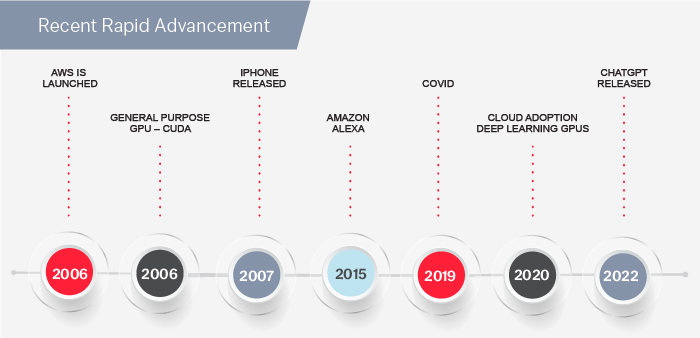
Along this journey, we witnessed rapid hardware advancements, such as the launch of AWS in 2006, which introduced the larger public to cloud computing, and the advent of General Purpose GPUs, which opened doors for the artificial intelligence (AI) and machine learning (ML) advancements we see today.
AI systems shaping the future of intelligent enterprise
When we talk about the rapid advancements in AI and ML, it’s worth noting that these technologies are older than commonly believed.
The first recurring neural network was published in 1925, and computer vision was invented in 1974, predating the worldwide web. The first transformer, which forms the basis for LLMs, was created in 1992, even before the release of the Intel Pentium processor.
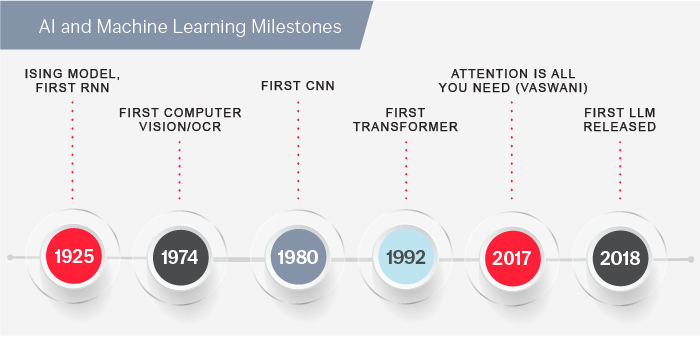
In 2018, OpenAI released the first LLM, GPT-1, which went relatively unnoticed. But within a short span of four years, its latest release has captured the attention and enthusiasm of everyone.
The hype surrounding LLMs is real. The “Peak of Inflated Expectations” has never been higher, in my opinion, and its momentum continues to grow.
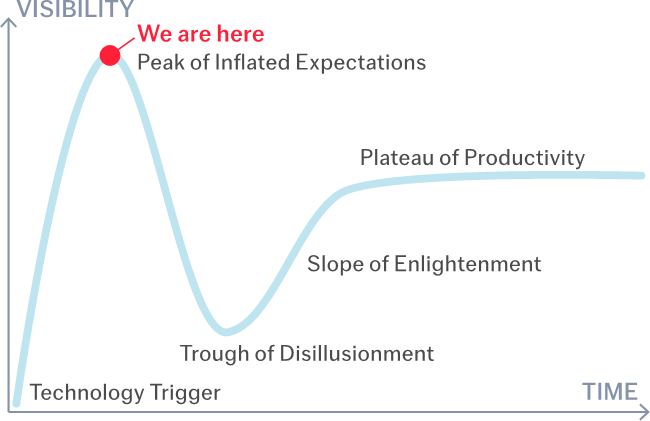
What makes it even more extraordinary is that this isn’t limited to the tech community; LLMs have gained widespread recognition. Everyone seems to have heard about what LLMs can do, what they are believed to be capable of, and even their perceived shortcomings.
In fact, the European Union quickly passed new AI legislation, a remarkable feat considering the pace at which lawmakers usually operate. Perhaps they sought inspiration from sci-fi movies or ChatGPT to draft the laws!
Leveraging ChatGPT with ABBYY Vantage
Blog
Potential and considerations for responsible use of LLMs in the future
By now, most people are familiar with the concept of “hallucinations” associated with LLMs. Numerous stories have been published, ranging from LLMs inventing scientific papers to creating entirely new laws to support legal cases. This has further fueled the public’s excitement, and while I believe that once we achieve the right implementation of this technology, it will bring about significant changes, we need to ask ourselves how we can get there.
First and foremost, we need accurate models. We discussed the vast volume of data available today, and while LLMs like ChatGPT have been trained on a significant amount of it, this abundance of data doesn’t necessarily guarantee an understanding of the context in which the model is operating. The context comes from the data foundation within your organization.
Many enterprises are eager to reach the finish line, hoping that LLMs can solve all their problems by providing insights from their extensive, but often disorganized and scattered, data. However, to make an LLM understand the desired context, you need the right data foundation and knowledge base. This is where the context injection technique comes into play.
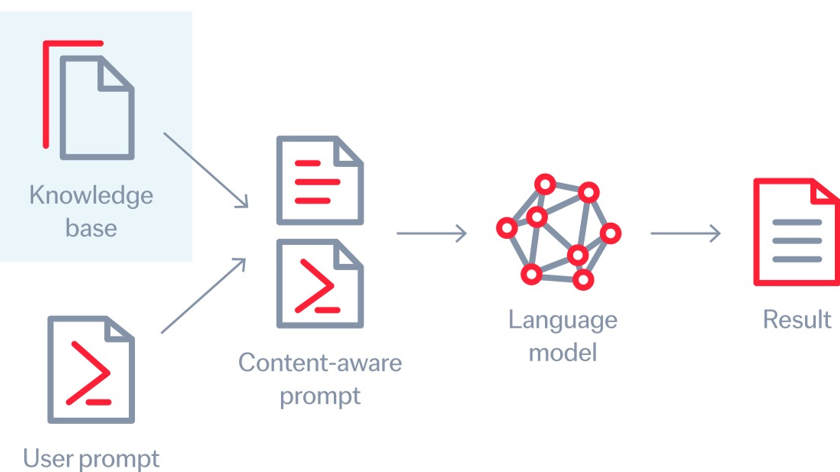
Context injection involves automatically adding additional knowledge to the user prompt, making the model content-aware before it interacts with the LLM. This ensures that the model operates within the confines and context of your organization. Therefore, the importance of accurate models cannot be overstated. To achieve this, organizations must fill their knowledge bases with accurate data before venturing into the realm of generative AI, without encountering the potential pitfalls.
To accomplish this, especially when dealing with large amounts of data locked within documents, intelligent document processing (IDP) is crucial. By leveraging machine learning and AI techniques specifically tailored to extract meaning from documents, you can build the knowledge base necessary to embark on your journey of leveraging generative AI. This is precisely what ABBYY’s technology does.
Promising future in AI puts your information to work
Let me emphasize that what we are witnessing today will undoubtedly transform the way we work with technology and live our lives. Just as the internet revolutionized how we access information, purchase goods and services, and consume media content, and as mobile devices brought technology to our fingertips and reshaped user experiences, AI is now ushering in the next wave of change.
AI provides us with a new interface that will redefine how we work, live, and leverage technology. It’s akin to the computer mouse taking us out of the era of green letters on black screens. I am excited to witness the unfolding future and discover how we will interact with our devices and applications in the coming years.
Join me on The Intelligent Enterprise as I explore a range of topics, including the latest AI regulations, and learn how ABBYY is at the forefront of applied AI. You can subscribe by filling out the form on the right side of the page on desktop or below this article on mobile.

Maxime Vermeir
Senior Director of AI Strategy
With a decade of experience in product and technology, Maxime Vermeir is an entrepreneurial professional with a passion for creating exceptional customer experiences. As a leader, he has managed global teams of innovation consultants and led large enterprises’ transformation initiatives. Creating insights into new technologies and how they can drive higher customer value is a key point in Maxime’s array of Subject Matter Expertise. He is a trusted advisor and thought leader in his field, guiding market awareness for ABBYY’s technologies.
Connect with Max on LinkedIn .
Additional Insights:
1 / 3
 Is Generative AI Trustworthy? Read more
Is Generative AI Trustworthy? Read more  The Gap Is Closing Between AI Innovation and Time-to-Value Read more
The Gap Is Closing Between AI Innovation and Time-to-Value Read more  How Banks Are Meeting Compliance Regulations and Fighting Fraud with AI and Machine Learning Read more
How Banks Are Meeting Compliance Regulations and Fighting Fraud with AI and Machine Learning Read more  How Process Mining Improves Business Processes and Prevents Cyber Threats Read more
How Process Mining Improves Business Processes and Prevents Cyber Threats Read more  Analysis Reveals Top Use Cases for IDP in US, Europe, and Asia-Pacific Read more
Analysis Reveals Top Use Cases for IDP in US, Europe, and Asia-Pacific Read more  Customer Point of View: Process Mining Reveals $6 Million in Savings Read more
Customer Point of View: Process Mining Reveals $6 Million in Savings Read more  The Second Tax Revolution—How Trustworthy AI Transforms Online Tax Filing Read more
The Second Tax Revolution—How Trustworthy AI Transforms Online Tax Filing Read more  How AI Can Help Government Agencies Win at Total Experience (TX) Read more
How AI Can Help Government Agencies Win at Total Experience (TX) Read more  Creating an Intelligent Automation Symphony Read more
Creating an Intelligent Automation Symphony Read more  Document AI Creating a Safer World Read more
Document AI Creating a Safer World Read more  Customer Point of View: Approach Automation Step by Step Read more
Customer Point of View: Approach Automation Step by Step Read more  Top Reasons Why Customers Abandon Your Onboarding Processes…and How to Fix Them Read more
Top Reasons Why Customers Abandon Your Onboarding Processes…and How to Fix Them Read more
Subscribe for updates
Get updated on the latest insights and perspectives for business & technology leaders
First name*
Last name
E-mail*
Сountry*
СountryAfghanistanAland IslandsAlbaniaAlgeriaAmerican SamoaAndorraAngolaAnguillaAntarcticaAntigua and BarbudaArgentinaArmeniaArubaAustraliaAustriaAzerbaijanBahamasBahrainBangladeshBarbadosBelgiumBelizeBeninBermudaBhutanBoliviaBonaire, Sint Eustatius and SabaBosnia and HerzegovinaBotswanaBouvet IslandBrazilBritish Indian Ocean TerritoryBritish Virgin IslandsBrunei DarussalamBulgariaBurkina FasoBurundiCambodiaCameroonCanadaCape VerdeCayman IslandsCentral African RepublicChadChileChinaChristmas IslandCocos (Keeling) IslandsColombiaComorosCongo (Brazzaville)Congo, (Kinshasa)Cook IslandsCosta RicaCroatiaCuraçaoCyprusCzech RepublicCôte d’IvoireDenmarkDjiboutiDominicaDominican RepublicEcuadorEgyptEl SalvadorEquatorial GuineaEritreaEstoniaEthiopiaFalkland Islands (Malvinas)Faroe IslandsFijiFinlandFranceFrench GuianaFrench PolynesiaFrench Southern TerritoriesGabonGambiaGeorgiaGermanyGhanaGibraltarGreeceGreenlandGrenadaGuadeloupeGuamGuatemalaGuernseyGuineaGuinea-BissauGuyanaHaitiHeard and Mcdonald IslandsHoly See (Vatican City State)HondurasHong Kong, SAR ChinaHungaryIcelandIndiaIndonesiaIraqIrelandIsle of ManIsraelITJamaicaJapanJerseyJordanKazakhstanKenyaKiribatiKorea (South)KuwaitKyrgyzstanLao PDRLatviaLebanonLesothoLiberiaLibyaLiechtensteinLithuaniaLuxembourgMacao, SAR ChinaMacedonia, Republic ofMadagascarMalawiMalaysiaMaldivesMaliMaltaMarshall IslandsMartiniqueMauritaniaMauritiusMayotteMexicoMicronesia, Federated States ofMoldovaMonacoMongoliaMontenegroMontserratMoroccoMozambiqueMyanmarNamibiaNauruNepalNetherlandsNetherlands AntillesNew CaledoniaNew ZealandNicaraguaNigerNigeriaNiueNorfolk IslandNorthern Mariana IslandsNorwayOmanPakistanPalauPalestinian TerritoryPanamaPapua New GuineaParaguayPeruPhilippinesPitcairnPolandPortugalPuerto RicoQatarRomaniaRwandaRéunionSaint HelenaSaint Kitts and NevisSaint LuciaSaint Pierre and MiquelonSaint Vincent and GrenadinesSaint-BarthélemySaint-Martin (French part)SamoaSan MarinoSao Tome and PrincipeSaudi ArabiaSenegalSerbiaSeychellesSierra LeoneSingaporeSint Maarten (Dutch part)SlovakiaSloveniaSolomon IslandsSouth AfricaSouth Georgia and the South Sandwich IslandsSouth SudanSpainSri LankaSurinameSvalbard and Jan Mayen IslandsSwazilandSwedenSwitzerlandTaiwan, Republic of ChinaTajikistanTanzania, United Republic ofThailandTimor-LesteTogoTokelauTongaTrinidad and TobagoTunisiaTurkeyTurks and Caicos IslandsTuvaluUgandaUkraineUnited Arab EmiratesUnited KingdomUnited States of AmericaUruguayUS Minor Outlying IslandsUzbekistanVanuatuVenezuela (Bolivarian Republic)Viet NamVirgin Islands, USWallis and Futuna IslandsWestern SaharaZambiaZimbabwe
I have read and agree with the Privacy policy and the Cookie policy .*
I agree to receive email updates from ABBYY Solutions Ltd. such as news related to ABBYY Solutions Ltd. products and technologies, invitations to events and webinars, and information about whitepapers and content related to ABBYY Solutions Ltd. products and services.
I am aware that my consent could be revoked at any time by clicking the unsubscribe link inside any email received from ABBYY Solutions Ltd. or via ABBYY Data Subject Access Rights Form .
Referrer
Query string
GA Client ID
UTM Campaign Name
UTM Source
UTM Medium
UTM Content
ITM Source
Page URL
Captcha Score
Connect with us
Also read:
- [New] Capturing Velocity Hero 4 Versus Ghost-S Racing
- [Updated] Essential Screen Capture Methods for Rainbow Six Siege for 2024
- [Updated] Perfect Pitches and Polished Pictures Music Mixing for YouTube
- [Updated] Stepwise Process Turning Video Clocks Backward on Snap
- [Updated] The Expert's Method for Timestamping Your YouTube Videos
- 解决无法使用的动态存储设备问题:详细指南
- Geautomatiseerde Instelling Van Hoevesteunen: Oplossingen Voor Besekt Apps in Windows 10/11
- Guía Paso a Paso Para Crear Una Versión Móvil Eficiente: Cómo Hacerlo
- Maximize Your Windows 11 Experience Through Customization
- Microsoft 365(Office 365)メールバックアップガイド:簡単な手順2点
- No-Cost Strategies for Stellar Data Resilience and Instant Recovery Solutions
- Play Store Not Working On Honor Magic 6 Pro? 8 Solutions Inside | Dr.fone
- The Guide to Retrieving Deleted or Missing Favorites in Microsoft Edge Browser
- Top 9 Vivo S18 Monitoring Apps for Parental Controls | Dr.fone
- Ursachen Und Behebung Des Fehlers 'Error Code 0X80070643 - Installation Fehlgeschlagen': Kompakte Anleitungen Für Windows-Benutzer
- Windows 10 Datenwiederherstellung Mit Versionierung: Vergleich Zwischen Nativem Feature Und AOMEI Backupper
- Xerox WorkCentre System Update
- Title: Shaping Tomorrow's Businesses with Advanced Large Language Models
- Author: John
- Created at : 2024-11-11 02:10:14
- Updated at : 2024-11-16 17:22:10
- Link: https://solve-hot.techidaily.com/shaping-tomorrows-businesses-with-advanced-large-language-models/
- License: This work is licensed under CC BY-NC-SA 4.0.
